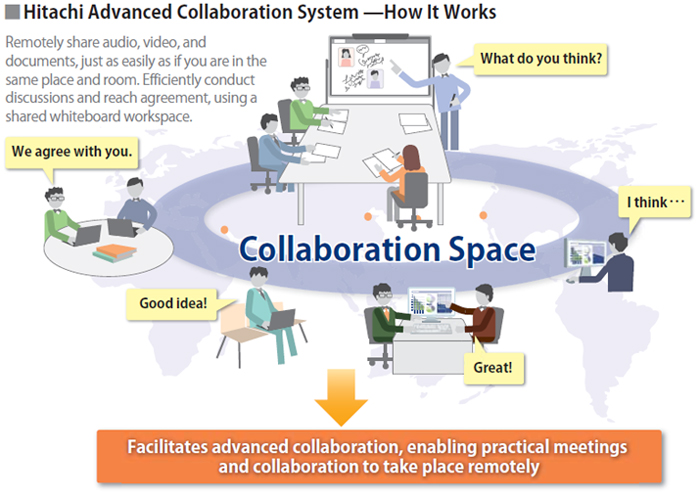For corporations, collaboration is essential to improving productivity. Corporations need to build environments that enable diverse human assets to effectively collaborate. This need is growing as workforces become increasingly dispersed both in time and place, and as workers increasingly work from home or outside the office on flex-time and satellite and international offices become more common. This case study looks at how the Hitachi Advanced Collaboration System (ACS) enables effective collaboration, focusing on how meetings are conducted at European companies, where there is an emphasis on work-life balance and work-style flexibility due to the historic and geographic background of rich ethnic, cultural, and religious diversity.

Meetings are an important platform for communication at corporations. Ideally, meetings should be a place for engaging in creative collaboration, but in reality, they often consist mainly of reports or end without a clear decision being made. In videoconferencing between remote locations, there is a tendency for one side to talk at length. In Japan today, corporations that are leading the way in globalization are aiming to conduct meetings that facilitate greater creativity. An example is the innovative meeting structure established by Nissan Motors during the reorganization led by CEO Carlos Ghosn, which has received a good deal of attention.
Switzerland has four official languages, and this may be a further reason why Swiss companies actively use visual tools in their meetings. These visual tools help facilitate a shared understanding beyond what text alone can provide.
Swisscom has offices across Switzerland and Italy. The office where Rice works is located in Zurich, but other key departments he communicates with are located in Bern, some 95 kilometers away. He also communicates with offices in Lausanne and Geneva, so many of his meetings are conducted remotely to save the expense of physically gathering everyone together for each meeting.
"In 2010, we replaced all our desktop phones with laptop computers equipped with Microsoft Lync software. This was done to reduce phone calls and enable everyone to connect regardless of where they were. In addition, we integrated Cisco TelePresence at our key offices to enable videoconferencing using high-definition video. We have found that the change in meeting format has made the meetings more dynamic," says Rice.
Emphasis on work-life balance is an important issue for companies in Europe, so there is a need to conduct meetings more efficiently in order to facilitate this balance.
"Some of my colleagues used to make two round trips a day between our offices by high-speed rail before the system was changed. I live in Zurich, and the number of trips I have to take to attend meetings in Bern has decreased. I sometimes connect to the system from home to join meetings," says Rice.
However, remote conferencing has some functional limitations. Colleagues can join meetings from any place and video makes it easier to pick up on conversational nuances, but there is no way to show each other documents and write on the documents simultaneously.
"It's difficult to share visually-oriented documents when conducting remote meetings. It's more productive and simpler to directly show the person sitting next to you what you wrote. There are no conventional remote conferencing solutions on the market that address this deficiency―other than ACS from Hitachi Solutions. We think ACS is the missing piece," says Rice.
Companies that engage in international business are likely to be the biggest business users of ACS. These corporations incur tremendous expenses for business travel every time they conduct training sessions and meetings, from having offices around the world. In addition, companies that are heavily dependent on visual data (such as drawings, diagrams, and photographs) are also expected to be major users of the solution, and Swisscom has already fielded inquiries from both types of companies.
"Financial institutions are another potential user, since Switzerland is a major center for private banking and other financial services. Banks typically take time to make investment decisions, and they require cross-border collaboration tools in order to speed up their decision making. We think that this sector will develop into our largest customer segment for ACS, within the next one to two years," says Rice.
ACS is drawing interest as a solution that is well-suited for the type of meetings conducted by European companies, where all participants are involved in discussions. At the same time, there is growing interest in the solution among corporations in Japan and other countries, as their corporate activities become increasingly globalized. Innovative meeting tools are needed to facilitate in-depth discussion and clear consensus-building in a multicultural environment. The ACS addresses these needs and promises to reshape the way that corporations conduct meetings.

Swisscom (Switzerland) Ltd. is headquartered in the outskirts of Bern, Switzerland and is the nation's largest telecommunications provider. Previously a government-owned telecommunications provider, Swisscom became a publicly-traded company in 1998. In addition to offering landline and mobile telecommunications services, Swisscom provides IT and network solutions to companies in and outside Switzerland, and has a workforce of some 20,000 people.